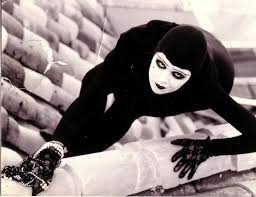PHENOMENALITY: *uncanny*
MYTHICITY: *fair*
FRYEAN MYTHOS: *drama*
CAMPBELLIAN FUNCTIONS: *sociological*
I don’t have much to say about this silent relic. I’ve been seeing accolades about the genius of French filmmaker Louis Feulliade for years, but I’ve seen no proof of said genius in either JUDEX or FANTOMAS. His second crime-oriented serial, LES VAMPIRES, is the dullest of the three, though possibly I might have been more involved had I seen its ten episodes in a theater as they were meant to be seen, rather than screening them on home video.
VAMPIRES is named not for supernatural creatures but for a gang of French crooks who style themselves “the Vampires.” They have no raison d’etre beyond committing assorted robberies, often clad in black leotards, which by itself would be enough to qualify the serial as metaphenomenal, even if the thieves didn’t also use exotic devices like sleeping gas and various poisoned objects. Though they’re pursued by an investigative reporter and his allies, the Vampires are indubitably the stars of the show. An actress named Musidora became internationally famous for portraying the henchwoman Irma Vep (“vampire” spelled sideways), and her popularity might proceed somewhat from the novelty of seeing a woman clad in a tight leotard back in 1915. Yet Irma’s not of any more particular consequence than any of the other exotically named criminals, such as “Satanas” and “Venomous.” Though in a structural sense VAMPIRES bears more resemblance to American sound serials than either of Feulliade’s other chapterplays, no single villain proves a standout as one sees even in early works like THE LIGHTNING WARRIOR. Possibly Feulliade, having been disparaged for adapting the stories of the controversial super-crook Fantomas, wished to avoid collecting more brickbats.
Every once in a while, an arresting scene appears in VAMPIRES—but for every one of these, there are two dozen in which characters sit around and talk, talk, talk. Some of the actors are not as affected as one finds in other films of the time, but this is more of a mystery-serial than an adventure-serial, and the detection of crimes is far more important than fights or murders. Around this time, American serials were ramping up the action with THE PERILS OF PAULINE and THE EXPLOITS OF ELAINE, while a number of prose writers, such as Edgar Rice Burroughs and Sax Rohmer, were gathering readers with a more bloody-minded approach than one arguably saw in popular authors of the 1900s. LES VAMPIRES may have seemed revolutionary in its time, but now it seems like a throwback to a more reserved era.

No comments:
Post a Comment